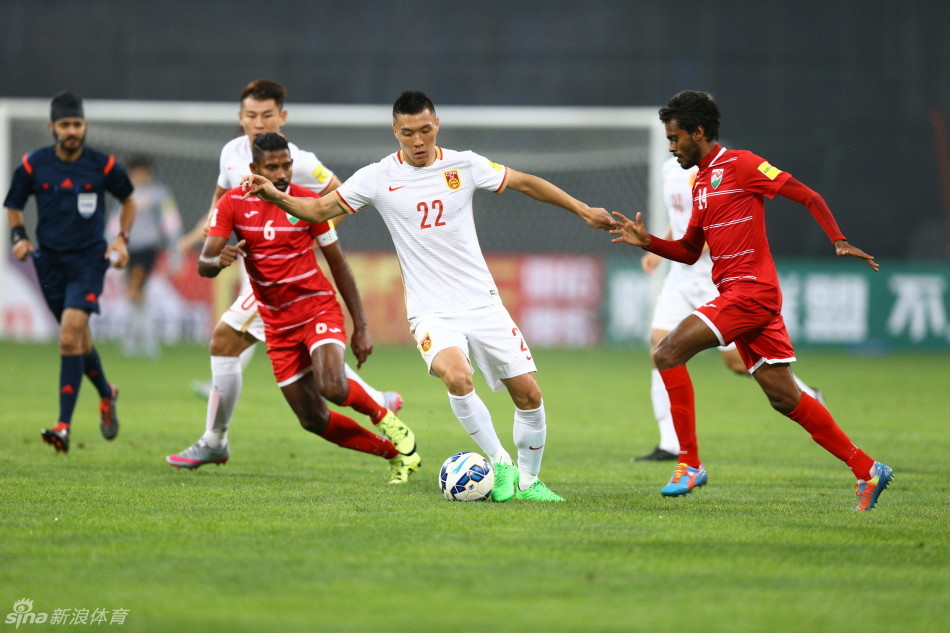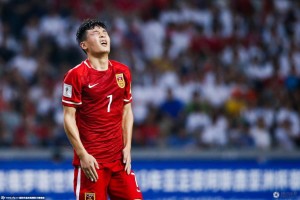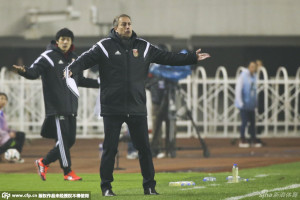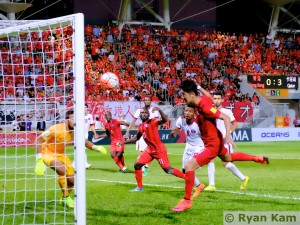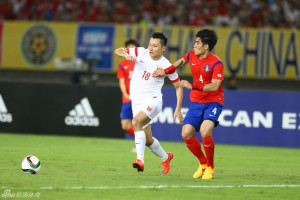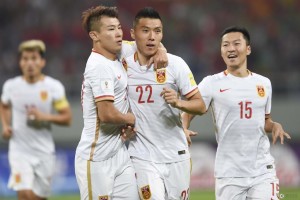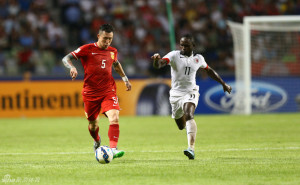With China set to take on Qatar in a huge World Cup qualifying game on Tuesday night, we offer a preview of what to expect. This includes a closer look at the Qataris history with China, their current side and the major issues surrounding the Chinese team – particularly the absence of a certain Gao Lin.
Preamble
China battle Qatar in Doha on Thursday night knowing that a defeat will severely hamper their chances of making it to the final phase of qualifying for Russia 2018. Last month’s 0-0 draw with Hong Kong means that China have seven points from three games, whereas the Qataris have taken the maximum of nine over the same number of matches (table here).
Should China lose, they will be five points adrift of Qatar and their hopes of catching their opponents will be entirely reliant on the Gulf State dropping points against either the Maldives, Bhutan or Hong Kong. While a win for the Chinese will send them to the top of the group, a draw will also keep their fate in their own hands, providing they win their four remaining matches – including the final one against Qatar in Xi’an next month.
With only the best four of the eight group runners-up advancing to the next round of qualification, it is imperative that China avoid defeat against the side eleven places below them in the latest FIFA Rankings. That will be easier said than done, though, as China prepare to take on a familiar foe.
Familiar Foe
When the qualifying draw was first made, China manager Alain Perrin was quoted as saying: “They are a side which I don’t want to be drawn against. I am familiar with their football.”
The Frenchman may have been referring to the four years he spent managing Qatari clubs and the under-23 national team, but he could also have been stating this from the point of view of every Chinese football fan. Qatar have now come up against China in five of the last eight World Cup Qualifying competitions, as well as three of the last five Asian Cups, and it hasn’t always gone well for Guozu.
Indeed, three of the previous four qualifying campaigns contested between these sides have seen Qatar come out with superior head-to-head results, and the Middle Eastern side also sank China 2-0 when they met in the group stages of the 2011 Asian Cup. On the bright side the only time China have had the better of Qatar over two matches was during their successful qualifying campaign for the 2002 World Cup.
Unfortunately, China’s failed 2010 qualifying campaign is far more recent, and that featured a five day period in which they drew 0-0 in Doha before suffering a 1-0 loss to the Qataris in Tianjin which all but eliminated the Chinese from qualifying. In that defeat, Uruguayan born striker Sebastian Soria scored the decisive penalty and he has been recalled to this Qatar squad by manager Jose Daniel Carreno.
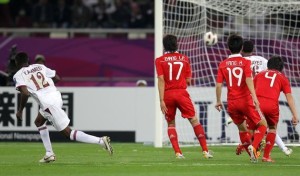
Yusef Ahmed scored twice against China in the 2011 Asian Cup and is back in the Qatar squad for this match
In fact, it seems as though the Uruguayan boss is hell bent on reminding China of their depressing past by also recalling Yusef Ahmed to the team. The lightening quick Al-Arabi striker scored both of Qatar’s goals in their 2011 Asian Cup victory over the Chinese and he will also be joined in this squad by returning winger Khalfan Ibrahim.
It seems that every Asian country has their own “Messi” and the consensus is that Ibrahim is Qatar’s. What makes the former Asian Player of the Year’s call-up particularly worthy of note is that, along with Ahmed and Soria, it is the first time he has been selected since Carreno took over in April.
In January, Qatar endured a disastrous Asian Cup, losing all three of their matches, and Carreno has been testing the water with new players. However, he has clearly felt the need for a partial return to the old guard for this massive clash.
A friendly draw with Northern Ireland at the end of May opened Carreno’s reign and was soon followed by a loss to Scotland. Since then, the 52-year-old has overseen four wins from four, that have included a couple of unconvincing performances.
Qatar needed nine minutes of injury time to overcome the Maldives 1-0 in their qualifying opener in Male, and almost let a 3-0 lead against Hong Kong slip last month when the Special Administratvie Region staged a late fight back to make it 3-2. In between those ,games Qatar beat Singapore 4-0 in a meaningless friendly and put fifteen goals past Bhutan in Doha. Of course, China only managed six of their own against the hapless Bhutanese, but that game was in the Himalayan Kingdom, and Bhutan’s defending in Qatar was far more toe-curlingly amateurish than it had been on their own turf.
With the return of three veterans to the squad, it is difficult to say who exactly is going to take the field for Qatar, but there will be some key players to watch out for. 21-year-old Ghanain born striker Mohammed Muntari has been ditched despite scoring four times in the last three games, and that may be because he had enough opportunities to more than double the hat-trick he managed against Bhutan.
This could open the door for either Ahmed or Soria to start up front and we could also see Ibrahim, who was widely touted as Qatar’s player to watch before the Asian Cup, return to the first eleven. Elsewhere, French born midfielder Karim Boudiaf has looked impressive in his box-to-box duties and offers a real aerial threat.
Winger Hassan Al-Haidos captains the side at the age of just 24, and his job on one of the flanks will be greatly assisted by Qatar’s attacking full backs. Both Mohammed Musa, on the right, and Abdelkarim Hassan, on the left, love to get forward, and each of them made it onto the score sheet against Hong Kong.
Indeed, Musa’s goal came courtesy of a rebound from Hassan’s saved shot, but the right back also grabbed two more strikes of his own in the demolition of Bhutan. Carreno may try to rein them in a little against stronger opposition, but their attacking threat is certainly something Perrin will be wary of when he selects his own team.
The Chinese Squad
There are only two changes from the 23-man squad called up for the games against Hong Kong and the Maldives, but one of them is absolutely huge. Veteran Guangzhou Evergrande striker Gao Lin was left off the list as a result of a poor attitude in a decision that has understandably drawn a huge amount of media attention
There had been some earlier reports that the 29-year-old had issues with Perrin and he didn’t feature in either of September’s World Cup qualifiers despite being on the bench. Among the current squad, Gao’s 85 caps are only topped by captain Zheng Zhi and the former Shanghai Shenhua forward is the Super League’s top Chinese scorer with 12 strikes this season.
That only tells part of the story, however, as Gao was suspended for five league games in July for throwing his shoes at a heckling Liaoning Whowin supporter during a post-match fracas and has scored just one goal in four CSL and AFC Champions’ League appearances since then. More importantly, perhaps, the Henan native has only found the net twice in sixteen appearances during Perrin’s tenure and is scoreless in his six international games in 2015.
Undoubtedly one of the national team’s most senior players, Gao actually captained China in their final East Asian Cup game in August and his omission from the squad is a major statement from Perrin. Significantly, the French manager seems to have the backing of Evergrande who have fined Gao 200,000元 and left him out of their recent Champions’ League quarter-final first leg against Gamba Osaka.
Although Gao’s absence is big news, it shouldn’t effect Perrin’s plans greatly. With China almost certain to start with just one up front, it will be either Yu Dabao or Yang Xu who will lead the line in Doha.
With Yang’s club form dipping in the second half of 2015, it will likely be Yu who gets the nod. The Guo’an man has managed seven goals in eight international appearances in 2015 and, despite struggling to impress as the lone forward in that frustrating 0-0 draw with Hong Kong, he scored two in the 3-0 win over the Maldives which will further convince Perrin of his worth as a striker.
Gao was replaced in the squad by Yu’s Guo’an teammate Zhang Chiming. The speedy winger will likely just make up the numbers and the only other real alternative Perrin has is to play Wu Lei as a “false 9”, but that hasn’t really worked in the past.
It’s also worth noting that the uncapped Bi Jinhao has been recalled to the squad after receiving his first inclusion last month, and the Henan Jianye man could provide an interesting attacking option should China find themselves chasing the game. Bi usually plays at centre back, but Henan boss Jia Xiuquan has occasionally deployed him as a target man striker alongside another forward. Bi with the ball at his feet is not a pretty sight, but he could be some use if China are behind and Perrin decides that lumping the ball up field is his best chance of finding an equaliser.
The other change in the squad saw Jiangsu Sainty right back Ji Xiang return in place of Guangzhou R&F centre back Yu Yang. Ji had been left out of the last squad after a dreadful performance against Japan in the last game of the East Asian Cup, while Yu has been nothing more than a fringe player in China’s recent 23-man lists.
On the face of it, this isn’t a move of enormous significance, but it could, perhaps, be a sign that Perrin intends to move apparent Chelsea and Real Madrid target Zhang Linpeng from right back into the centre of defence where it has long been speculated he could move permanently. With Rayo Vallecano’s Zhang Chengdong also in the squad, China now have three possible right backs and only five players who can play centre back.
One of those who can play in the middle is the inexperienced Bi Jinhao and another is captain Zheng Zhi who is unlikely to be sacrificed from the midfield. That leaves just Ren Hang, Mei Fang and Zhang Linpeng who can play in the centre of defence and we could see Zhang partner Evergrande teammate Mei in the centre and Ren start at left back like he does for club Jiangsu Sainty.
The advantage of that would be that Ren is much better defensively than alternate left backs Zou Zheng and Jiang Zhipeng, and could provide better cover against Qatar’s marauding right back Mohammed Musa. The problem is that it would leave either Ji or Zhang Chengdong to play on the right side of defence.
With Ji’s recent struggles against Japan and Zhang Chengdong yet to play a game since leaving Guo’an for La Liga in August, Perrin may still see Zhang Linpeng as a safe pair of hands at right back. Should that be the case Ji and Zhang Chengdong can also be deployed as wingers who offer better defensive cover than the likes of Zheng Long or Sun Ke.
Prospects
That draw with Hong Kong has piled unnecessary pressure on to Alain Perrin’s men as they go to Qatar knowing they must avoid defeat. When the draw was made, this was always going to be the hardest game, but it was one China could probably afford to lose provided they did their job in all their other fixtures.
That ship has already sailed and so a draw is an absolute minimum. China hasn’t won a competitive match away to a West Asian nation since a victory over Lebanon in 2009, but the good news is they don’t need to win this match. A draw will be sufficient and their last three qualifiers played in Qatar have all ended in a tie.
It would be great to see China go all out for a win here, but that seems unlikely and we will probably be treated to a largely defensive affair that may or may not be brightened up should Qatar’s full backs remain in all out attack mode.
As the 39 unsuccessful shots against Hong Kong demonstrates, one of China’s biggest issues recently has been wasting opportunities in front of goal. Chances for both sides are likely to be limited and so that level of wastefulness could prove costly here.
On paper, China are a better team than Qatar and should earn the draw they need to stay in the hunt for first. Whatever happens, though, it is likely to be a nervy occasion for those on the pitch and those watching back in the Middle Kingdom. Prediction 1-1
Full Squad List
Goalkeepers: Wang Dalei (Shandong Luneng), Zeng Cheng (Guangzhou Evergrande), Yan Junling (Shanghai SIPG)
Defenders: Mei Fang, Zhang Linpeng, Zou Zheng (all Guangzhou Evergrande), Ren Hang, Ji Xiang (both Jiangsu Sainty), Zhang Chengdong (Beijing Guo’an), Jiang Zhipeng (Guangzhou R&F), Bi Jinhao (Henan Jianye)
Midfielders: Zheng Zhi, Zheng Long, Yu Hanchao (all Guangzhou Evergrande), Wu Xi, Liu Jianye, Sun Ke (all Jiangsu Sainty), Wu Lei, Cai Huikang (both Shanghai SIPG), Zhang Chiming (Beijing Guo’an), Wang Yongpo (Shandong Luneng)
Forwards: Yang Xu (Shandong Luneng), Yu Dabao (Beijing Guo’an)
